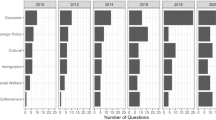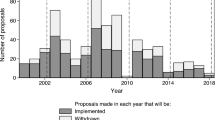Abstract
Representative democracy does not necessarily eliminate political corruption. Existing models explain the survival of rent-taking politicians by ideological divisions in the electorate and/or informational asymmetries. The current paper demonstrate that rent extraction can persist even if voters are fully informed and ideologically homogenous. We show that in such an environment, voters may gain by persistently reelecting a rent-taker that limits his rent extraction. Such an equilibrium occurs when voters and politicians do not discount the future too heavily, and the share of honest candidates is relatively small.
Similar content being viewed by others
References
Austen-Smith, D., & Banks, J. (1989). Electoral accountability and incumbency. In P. Ordeshook (Ed.), Models of strategic choice in politics. Ann Arbor: University of Michigan Press.
Banks, J., & Sundaram, R. (1993). Adverse selection and moral hazard in a repeated elections model. In W. Barnett et al. (Eds.), Political economy: institutions, information, competition and representation. New York: Cambridge University Press.
Barrett, S. (1999). A theory of full international cooperation. Journal of Theoretical Politics, 11, 519–541.
Barro, R. (1973). The control of politicians: an economic model. Public Choice, 14, 19–42.
Besley, T. (2006). Principled agents? The political economy of good government. Oxford: Oxford University Press.
Bågenholm, A. (2009). Politicizing corruption. The electoral impact of anti-corruption discourse in Europe 1983–2007. QoG Working Paper Series 2009:10. University of Gothenburg.
Chang, E., Golden, M., & Hill, S. (2008). The electoral consequences of corruption. Los Angeles: UCLA (unpublished).
Cheibub, J., Gandhi, J., & Vreeland, J. (2010). Democracy and dictatorship revisited. Public Choice, 143(1,2), 67–101.
Divjak, B. (2010). Rise and fall of prime minister Ivo Sanander. Adriatic Institute, 19th February 2010.
Dobratz, B., & Whitfield, S. (1992). Does scandal influence voters’ party preference? The case of Greece during the Papandreou era. European Sociological Review, 8, 167–180.
Fearon, J. (1999). Electoral accountability and the control of politicians: selecting good types versus sanctioning poor performance. In A. Przeworski, S. Stokes, & B. Manin (Eds.), Democracy, accountability and representation. Cambridge: Cambridge University Press.
Ferejohn, J. (1986). Incumbent performance and electoral control. Public Choice, 50, 5–26.
Harsanyi, J., & Selten, R. (1988). A general theory of equilibrium selection in games. Cambridge: MIT Press.
Hayek, F. (1979). The political order of a free people. Law legislation and liberty (Vol. 3). Chicago: The University of Chicago Press.
Maskin, E., & Tirole, J. (2004). The politician and the judge: accountability in government. The American Economic Review, 94(4), 1034–1054.
Norris, P. (2009). Democracy Timeseries Data Release 3.0, January 2009. John F. Kennedy School of Government, Harvard University.
Papas, T. (2003). Depolarization, cleavage liquidation, and two-partyism: the declining role of ideology in post-war Greek politics. Conference paper, Joint Sessions, ECPR, Edinburgh.
Patrikios, S., & Karyotis, G. (2008). The Greek parliamentary election of September 2007. Electoral Studies, 27(2), 356–359.
Polo, M. (1998). Electoral competition and political rents. Milano: Innocenzo Gasparini Institute for Economic Research (unpublished).
Polychroniou, C. (2008). Political culture and corruption in Greece: a synergistic relationship. Online Journal, February 4th, 2008.
Popper, K. (1989). Conjectures and refutations. The growth of scientific knowledge. London: Routhledge.
Riker, W. (1982). Liberalism against populism: a confrontation between the theory of democracy and the theory of social choice. San Francisco: Freeman.
Schumpeter, J. (1942). Capitalism, socialism, and democracy. New York: Harper.
Samuelson, L. (1997). Evolutionary games and equilibrium selection. Cambridge: The MIT Press.
Svensson, J. (1997). The control of public policy: electoral competition, polarization and primary elections. Washington DC: The World Bank (unpublished).
Whitehead, L. (2000). High-level political corruption in Latin America: a “Transnational” Phenomenon. In J. Tulchin & R. Espach (Eds.), Combating corruption in Latin America. Baltimore: Johns Hopkins University Press.
Author information
Authors and Affiliations
Corresponding author
Rights and permissions
About this article
Cite this article
Helland, L., Sørensen, R. Persistent rent extraction. Public Choice 153, 205–213 (2012). https://doi.org/10.1007/s11127-011-9785-z
Received:
Accepted:
Published:
Issue Date:
DOI: https://doi.org/10.1007/s11127-011-9785-z




